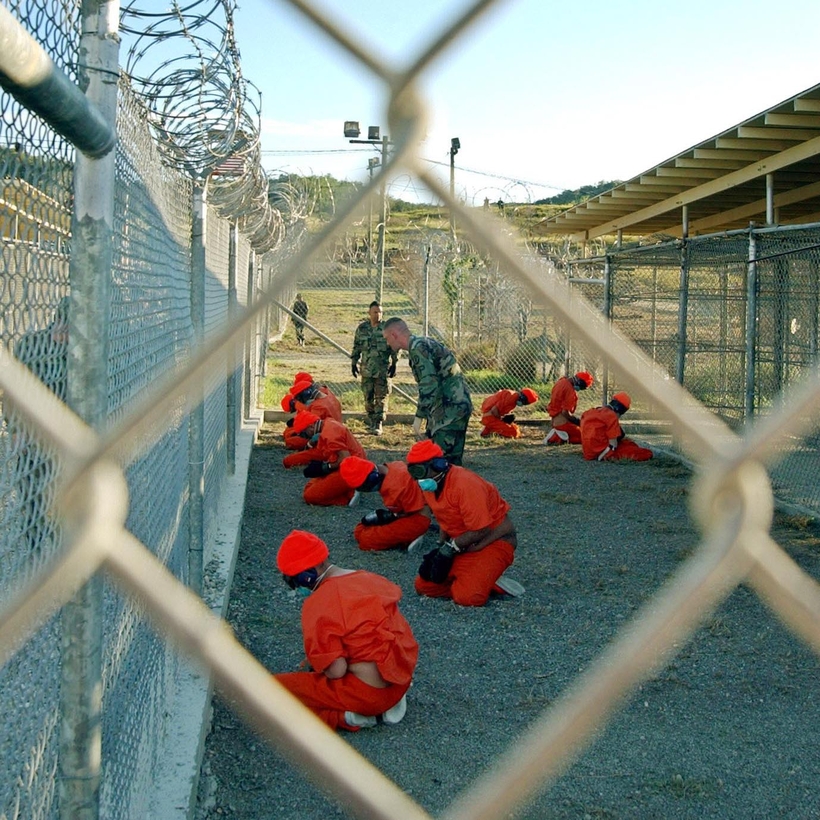Sensory deprivation and solitary confinement, punctuated by patches of ocean and blue sky. Hunger strikes and forced feedings, broken by meals shared with a friendly iguana. And the enduring question of whether to riot and resist or negotiate to make life more bearable at Cuba’s Guantánamo Bay detention camp, a place many lawyers and human-rights advocates say should have never existed in the first place.
These are the contrasting moments of humiliation and hope depicted by Mansoor Adayfi, known throughout his time at Guantánamo as “Detainee 441,” in his new memoir, Don’t Forget Us Here: Lost and Found in Guantánamo. Adayfi spent 14 years at the prison, which once held 780 men accused by the U.S. of being connected to al-Qaeda and the September 11 terrorist attacks—often with scant evidence.

George W. Bush opened it; Barack Obama tried to close it; Donald Trump vowed to “load it up with some bad dudes.” Now, following a disastrous retreat from Afghanistan, Joe Biden is tasked with closing the prison, which has rolled into its 20th year with just 39 prisoners.
“Guantánamo is a machine that crushes people,” Adayfi tells me via video call from his apartment in Serbia, the country where the U.S. government re-settled him in July of 2016, having deemed it too unsafe for him to return to his homeland of Yemen.
“Whether guards or detainees, Guantánamo changed anyone it touched,” Adayfi tells me. During his time there, Adayfi says, he was beaten, psychologically tortured (including having had female interrogators touch his genitals), and made to sleep with bright lights on. Yet his book is also about “finding light in the darkness and the shared humanity we had there,” he says—no easy task given the ruling ethos of the prison: “Sympathy is a crime.”
Life Behind Bars
Adayfi was working in Afghanistan in the fall of 2001 when he was kidnapped and sent to a C.I.A. black site before getting transferred to Guantánamo for alleged ties to al-Qaeda, which, all these years later, have never been proved. (In Don’t Forget Us Here, Adayfi writes that he was in Afghanistan working as a research assistant to a professor at Yemen’s Islamic Institute for a book he was writing on al-Qaeda’s ideology.) He was just 18 when he was imprisoned.
Adayfi and his co-writer, Antonio Aiello, give shape to the prison through key events—the forced feedings, the failed escapes, the humiliation suffered at the hands of American guards—that the world has seen in the form of headlines throughout the years but has never before heard from the mouth of a man on the inside.

Adayfi recalls the American lawyers who offered him and other detainees pro bono counsel; Obama’s election and pledge to close Guantánamo and end the eternal process of pleading to boards for release without ever having been charged with a crime. (A periodic-review board expressed uncertainty over whether Adayfi was even a member of al-Qaeda.)
Threaded throughout are descriptions of Adayfi’s friends and moments of hope as conditions in the camp improve—English lessons led by other detainees, art classes, informal lessons on married life for the younger men, and disputes over whether Game Boys could be used to access pornography.
For almost three years, Aiello and Adayfi pieced together the narrative that Adayfi had scrawled on bits of paper while in Guantánamo and mailed to his lawyer, who carefully collected them. During our call, Adayfi proudly pulls out the papers from a brown legal folder, crumpled pages covered in flowing Arabic and stamped: APPROVED BY US FORCES. Aiello tells me they were written as though by someone in “a mad rush to compile these memories.”
Adayfi was kidnapped and handed over to the C.I.A. for alleged ties to al-Qaeda, which, all these years later, have never been proved. He was just 18 when he was imprisoned.
Since his release, in 2016, Adayfi, now 39, has struggled with social isolation, which has made it difficult to work, make friends, and marry. He is subject to stigma and state surveillance, and he was given no travel documents, so he cannot exit the country. Adayfi says he never wanted to come to Serbia—he had requested to be re-united with family in Qatar—and does not know when he will be able to leave.
Adayfi’s experience resembles that of many of the other 150 detainees re-settled into 29 countries because it was unsafe for them to return home. Some have since been deported back into conflict zones.

“When we arrived, we found our cases were handed to the secret service or police,” Adayfi says of himself and the others who, like him, were relocated to far-flung places following stints in Guantánamo. “There is no such thing as re-settlement,” he says. “It is imprisonment.”
Twenty years after September 11, Adayfi feels the U.S. should apologize and make amends for holding detainees such as himself, without charge and for so long. “The U.S. government should acknowledge what happened there and compensate people so they can move on with their lives,” he says, adding that he would like to work with the Biden administration to set up rehabilitation programs for former detainees.
Back in Adayfi’s apartment, a white wall is covered with fluorescent sticky notes outlining his next project—a book on life after Guantánamo, based on the lives of the dozens of detainees he remains in contact with. “Part of me is still at Guantánamo,” Adayfi says. “I always wear the orange scarf to symbolize that part of me is still there, and it is my duty to protest for the brothers there.”
Don’t Forget Us Here: Lost and Found at Guantánamo, by Mansoor Adayfi, is out now
Clair MacDougall is a Burkina Faso–based journalist. She has extensively covered life and conflict throughout the African continent

